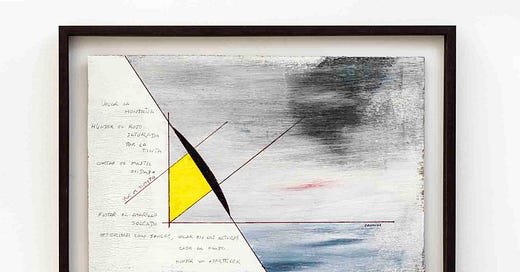I took a marked seminar called Archive Poetics this semester. These are two nebulous terms to start with. In an MPhil literature seminar (‘to be playful with the term’… ‘if no one objects to this theoretical breadth’…) the integrity of the archive did not stand a chance.
‘Archive’ means both the place where the records are kept and the records themselves. The double-pronged signification arrives through the Greek ‘arkheion’ (‘public building’), from ‘arkhe’ (‘government’, but literally ‘origin’ from the verb ‘arkhein’ (‘to be the first’)). We continue to think of the archive as the synthesis of place and records extending from an origin. Its fourth and final requirement is some kind of ordering principle, an instinct to stand in line behind the origin and number off. Derrida distinguished the ‘archivable’ archive (content) from this ‘archiving’ archive (form).
After two weeks of sitting around the table in seminar room x these stipulations no longer seem so definitive. All they state is that an archive is non-chaos that exists in time. That’s letters, diaries, rhyme, libraries, a chair that Gertrude Stein once sat in. Checking a dictionary won’t help. That’s the pinnacle of the ‘archiving’ instinct, every stitch in the material of expression conquered alphabetically and temporally - with examples - each word an archive of words that came before. Poets go to the dictionary for words. Lexicographers go to poems for citations. They play jump rope together with the hermeneutic circle. Once the archive unravels, it plagues your peripheral vision, even beyond the wall-to-ceiling glass of seminar room X. This is not a Baader-Meinhof phenomenon and it's not what Derrida meant by Archive Fever. Non-chaos existing in time is just hard to get outside of. It’s in the erg’s ‘memory’, and the updates of every app on your home screen. ‘Archive’ is a default tab on Substack.
After the seminar convenes for its final week, I no longer have to be in Cambridge. I get the train down to the South Coast (the age rings of the tree blocking the line are the archive of its growth/ the face of the woman standing on my foot is the archive of her ancestors) and walk along the esplanade every evening. In the ocean, sodium has a residence time (the time taken for a substance to enter and leave suspension) of 260 million years, meaning that the blood of every person drowned at sea is still flailing in saltwater. The sea is haunting, circulation, trace, but it is not archive; it is its antithesis. At once planetary and local, ocean water cannot be understood as a place. Its interminable cycling defies origin. To be ‘lost at sea’ is to be an ‘archivable’ without ‘archiving.'
To bow down to the power of an archive is to forget that hackneyed truism that each memory is just a remembering of its last occurrence. The ocean’s surface reflects imperfectly, more it than you and time dilates as much in the white water under Hastings Pier as it does in the depths of the Mariana Trench.





Lovely! And I do love the idea of the sea being history.